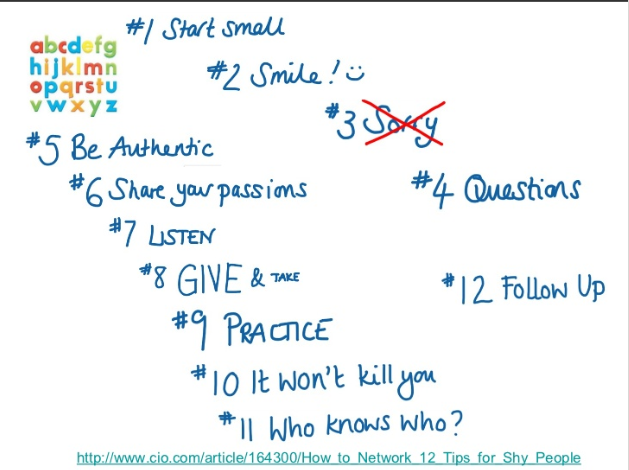A few weeks ago I delivered a short conference talk about networking and I started reflecting on my own fears of networking and the lessons I have learnt. Researching slides for my talk I found one particular slide from a Slideshare presentation which really made me consider the importance of authenticity of networking and how you can use authenticity as a strength in meeting others.
From https://www.slideshare.net/sarashinton/confident-networking-10365094
Networking has never been my specialty, I used to cringe just hearing the word and anxiety would immediately surface. I always struggled with the idea of being “formal” and “professional” and asking “advanced” questions, showing my expertise in whatever field I was supposed to show expertise in on that specific day. I over – prepared, didn’t sleep the night before and felt completely like an imposter at any event I attended. This resulted in me not being myself, perhaps acting too formal and I didn’t really succeed in getting many contacts (to be honest, I hardly talked to anyone and I would be surprised if anyone remembered me in those early days).
But as with most things, with practice networking becomes a little easier. I quickly realised that my networking strengths are to be myself, be as authentic as possible, smile, find common ground and go with it. I have realised that being myself, with my own quirks, strengths and weaknesses, is how I connect with other people, both socially and professionally.
Now, If I am ever at a “networking event” I generally try and seek out anyone that looks slightly informal (because formal is not something you think of when you meet me) with an authentic smile on their face, generally by the snack table as then I can start the conversation with a question about before mentioned snacks. Other topics I start with generally include the weather or the commute in (especially if I am in London) or a good combination of both: “so how did you cope with the heat this morning then?” or “were you lucky enough to avoid the rain this morning?” Luckily for me, I enjoy talking about the weather and I find that others seem to do that too, although not always. When I finally feel I have gained some kind of rapport, I then go on to ask more relevant questions, about their job, what they are finding interesting about the event, see if we have common careers and/or research interests, discuss more about these interests, and then, if all go well, an exchange of names at the end and a promise of connecting on Linkedin. I feel I leave the event with not only a connection, but also someone I know a little more about than just what their job is.
At the conference where I delivered my workshop I actually met with an employer who told me he recruits mostly from the people he meets at events and conferences, not through formal interviews. He said that through informal conversations he got a feel for the personality of the person and the real passion and interest of relevant topics, and if those topics coincided with his recruitment needs (in this example it was biology research), he would take their contact details, keep them in a folder on his computer and contact the person if anything came up. He also said that he appreciates students/researchers to keep in touch with him and said he was about to meet one over coffee as he was going to Berlin and this person is working in Berlin at the time. So you never know what will happen after just a short conversation at an event!
Students often tell me they don’t know how to network. They often comment that they find asking strangers for favours or for an internship/job is rude and uncomfortable. I often respond that even though one of the key purposes of networking is to find a job, the first point of contact is just saying hi to someone, be authentic and yourself and see if you have anything in common, whether that is job/sector interests, research interests or career interests (or food/weather interests, in my case). And off you go…..
A couple of resources for you:
- Article on authenticity in networking from idealistcareers - https://idealistcareers.org/authentic-networking-what-is-it-and-why-does-it-matter/
- Previous blog entry from our colleague Anne Cameron - https://blogs.bath.ac.uk/careers/2014/10/30/networking-nightmares/
- A recent blog article and a good example of networking from University of Warwick: https://careersblog.warwick.ac.uk/2018/06/19/building-a-network-to-develop-your-career/
Respond

